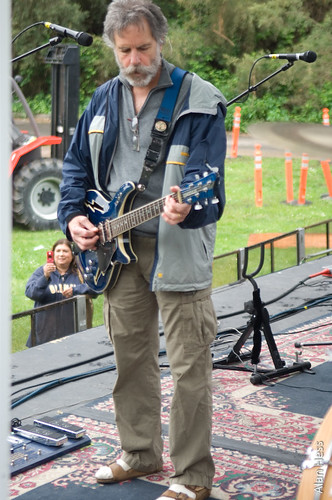photo by Dave Rosenberg
April 1, 2005
First Appeared in The Music Box, April 2005, Volume 12, #4
Written by John Metzger
The past few years have held their share of challenges for Bob Weir and his band Ratdog. While the ensemble has weathered several personnel changes since its debut in 1995, none have held the potential for causing such critical structural damage to the collective’s foundation as the departure of Weir’s longtime collaborator, friend, and bass player Rob Wasserman, who announced in early 2003 that he was leaving the group in order resume his solo career. Then, just as newcomer Robin Sylvester was beginning to become firmly entrenched within Ratdog’s heady swirl of disparate sounds, Weir succumbed to exhaustion in late 2004, forcing the collective to cancel its ambitiously extensive fall tour just moments before it was about to begin. With the change of seasons and the dawning of Spring, however, comes new hope, and on April Fool’s Day, the rejuvenated ensemble settled into Chicago’s Vic Theatre for what would prove to be an evening that playfully featured a variety of ruminations on love and loss. From the celebratory medley of The Champs’ Tequila, Bob Dylan’s Silvio, and James Crawford, Jr.’s Iko Iko that opened the show to the solitary stroll through Black Muddy River that concluded it, Ratdog managed to weave together two sets of material, none of which ever strayed from its single-minded, thematic purpose. The raucous carousing of Hell in a Bucket, the bittersweet memories of This Time Forever, the cautionary Deep Elem Blues, and the bubbly amorousness of Bombs Away perceptively explored relationships from every angle imaginable.
photo by Norman Sands
Not that one needed to comprehend the concert’s cerebral overtones in order to enjoy it. Indeed, being the quintessential collective, Ratdog delivered a performance that also was perfectly suited for the hard-partying, Friday night crowd. Fusing feel-good rhythms with mind-expanding jams, the ensemble effortlessly surfed from one genre to the next, leading the audience through a sing-along of Dylan’s folk-fueled Masterpiece and delving into both the soulful blues of Sugaree as well as the percolating ebullience of Scarlet Begonias. With each song, the group seemed to re-calibrate itself, and although it sometimes stumbled — the segue that was meant to link the biting edginess of Bury Me Standing with the soft-spoken balladry of This Time Forever nearly collapsed — more often than not, the band discovered a path that permitted a seamless passage into its next selectio. It was everything she said it was



